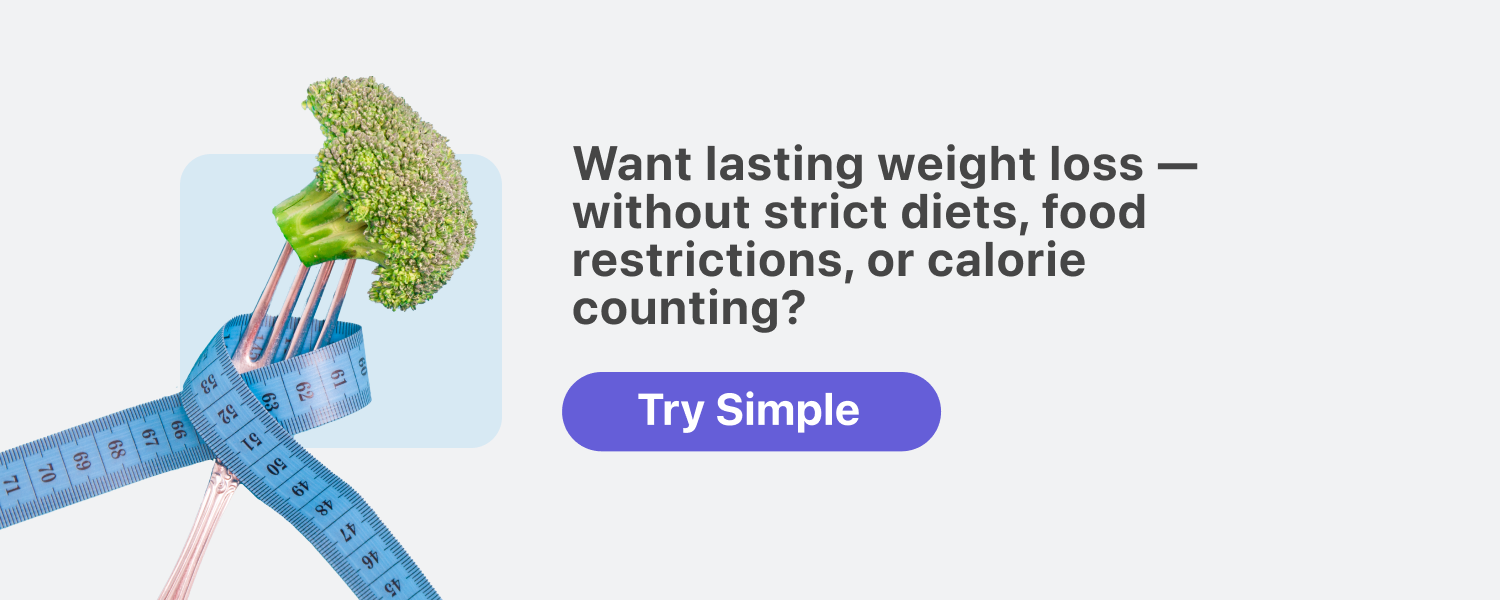Simple’s guide on intermittent fasting for skin health

Your skin copes with a lot. If you live in a hot, sunny climate, it can receive almost constant sun damage. If you live where it’s cool and dry, you may have to work harder to keep it hydrated. Big cities cover it in smog and dirt.

It’s not just where you live: so many things can affect your skin’s health. Your job, how you sleep, what you eat, where you socialize, how you relax — it all takes a toll on your skin. (Don’t even get us started on aging and genetics.)
You buy cream after cream, get facial after facial, and try scrubs, serums, and treatments galore. You could open your own store with all the skincare products and tools you’ve collected. But here’s some good news: there’s one more tool you can add to your arsenal and it won’t cost you a penny — fasting for skin health.
Yep, it’s a thing! And we’re here to tell you all about it.
Benefits of intermittent fasting for skin health
There are many possible intermittent fasting benefits, but we’re going to focus on the ones that can support skin health. Does fasting’s impact on reducing inflammation, improving blood sugar, and improving gut health mean it’s helpful for clear skin?
Reduced oxidative stress
Oxidative stress is when the body can’t keep up with the amount of free radicals (harmful molecules that can cause damage to cells, proteins, and DNA) being produced by the environment, UV rays from the sun, and lifestyle habits (smoking, excessive alcohol intake, etc.).
Antioxidants produced by the body and found in foods help to fight those rascally free radicals. Intermittent fasting has also been shown to reduce oxidative stress in people who are carrying extra weight.[1]
Reduced inflammation
Inflammation is a natural immune response when our bodies “turn up the heat” on intruders like bacteria or injuries in order to heal.
Inflammation becomes a problem when it’s triggered by long-term factors — like excess body fat, smoking, or a sedentary lifestyle — and becomes chronic. Chronic inflammation can cause cellular damage, showing up as skin conditions like acne, psoriasis, or advanced aging.
Intermittent fasting can reduce inflammation and help contribute to preventing skin damage before — by minimizing cell damage — and after — by helping skin cells repair and rejuvenate through autophagy (don’t worry, we’ll explain more about autophagy in a while).[2]

Improved insulin sensitivity
Insulin is a hormone that transports energy from the food we eat into our cells for use. It stores unused energy as fat, and its efficiency plays a major role in metabolism, weight management, and the prevention of certain chronic diseases from developing.[3]
It’s thought that excess insulin can trigger acne (more on this later). For people with insulin insufficiency or diabetes, elevated blood sugar can lead to skin issues like dry skin or impaired wound healing. One of intermittent fasting’s many possible benefits is improved insulin sensitivity.[4]
Improved gut health
Another way fasting might help clear skin is by improving the gut microbiome. The research on the relationships between fasting and gut health in humans is limited — but promising.[5]
A leaky or inflamed gut can manifest in skin issues such as food sensitivities, acne, and psoriasis.[6]
Induced autophagy
Autophagy is a natural process in which our cells break down, clean themselves out, and rebuild themselves. This process happens naturally while you sleep (and sometimes when our bodies are in a stressed state).
The autophagy process, along with collagen production, slows as we age, causing sagging, reduced skin rejuvenation, and possible skin conditions.
Fasting can help your body get a jump start on its usual overnight autophagy process.
To see if some of these benefits can work for you, take our Simple quiz and try an intermittent fasting routine for yourself. Tell us your goals and needs, and we’ll help you get up and running!
Foods and your skin

There are many reasons your diet might affect your skin. Allergies, sensitivities, and genetics are just a few. Everyone is different, and different foods can trigger skin issues in different people, but the underlying cause is an inflammatory response.[7]
Even if you’re not allergic to any particular foods, a high intake of certain foods can still trigger inflammation in your body, which then shows up on your skin. Gut health is another possible factor in how your skin reacts to foods.[8]
To help you understand how food and your skin interact, let’s look at how your eating habits could be related to some common skin problems.
Trouble foods for acne
- Dairy
Dairy is a common trigger food for acne.[9]
It’s not clear exactly why — perhaps it’s inflammation caused by the hormones in dairy or the sugar content, which we’ll go into next — and it doesn’t affect everyone the same way.
Whatever the reason, decreasing dairy might be a good place to start if you experience acne. However, we recommend that you first speak with your healthcare provider before making any significant lifestyle changes, as doing so without support may impact your health.
- Sugar
Excess sugar intake has long been shown to aggravate your skin and contribute to acne.[10] Think of added sugars in candy, cakes, and chocolates. This is believed to be because sugar triggers increased insulin levels.[11] Elevated insulin triggers sebum production. Sebum is an oily substance that clogs your pores.
If you’re looking to answer the question of “Does fasting help with acne?” for yourself, you can give it a try and see! Take our Simple quiz for guidance on where to get started.
The best foods for youthful skin
An important part of successful intermittent fasting is what you eat when you’re not fasting. Whether you’re fasting for skin benefits or any other health reason, shooting for these health-promoting foods more often than not is key.
- High-fiber foods. Fruits, vegetables, and whole grains help with blood sugar control and also feed the good bacteria in your gut.
- Foods high in antioxidants. Remember those pesky free radicals? Well, high-antioxidant foods help fight them off. For vitamins C and E, eat berries, avocado (also a berry!), and citrus fruits. For other antioxidants, try green tea, dark chocolate, and olive oil.
- Foods high in vitamin A. Sweet potatoes, dark green leafy vegetables, tomatoes, pumpkin, and red and yellow peppers are great sources of vitamin A (and vitamin C, too). Eggs, fatty fish, and fish oils are also excellent choices.
- Healthy fats. Nuts, like walnuts and almonds; seeds, like chia, flax, and pumpkin; and fatty fish, like salmon, halibut, mackerel, and sardines, all make the cut for healthy sources of fat.
One common intermittent fasting mistake that beginners make is not knowing what to eat while fasting. Use this list to help you get started. Being sure to eat enough essential nutrients is vital to fasting’s ability to support slower skin aging.[12]

Frequently asked questions about intermittent fasting for skin health
How long you should fast for skin health is down to your needs and the results you want. How long fasting takes to work will depend on the schedule you choose and the foods you eat. Fasting results vary from person to person, so take those intermittent fasting for skin before and after pics to track your progress.
- Mohr AE, McEvoy C, Sears DD, Arciero PJ, Sweazea KL. Impact of intermittent fasting regimens on circulating markers of oxidative stress in overweight and obese humans: A systematic review of randomized controlled trials. Advances in Redox Research. 2021 Dec 1;3:100026.
- Wang X, Yang Q, Liao Q, Li M, Zhang P, Santos HO, et al. Effects of intermittent fasting diets on plasma concentrations of inflammatory biomarkers: A systematic review and meta-analysis of randomized controlled trials. Nutrition. 2020 Aug 12;79-80:110974.
- Rahman MS, Hossain KS, Das S, Kundu S, Adegoke EO, Rahman MA, et al. Role of Insulin in Health and Disease: An Update. Int J Mol Sci [Internet]. 2021 Jun 15;22(12).
- Yuan X, Wang J, Yang S, Gao M, Cao L, Li X, et al. Effect of Intermittent Fasting Diet on Glucose and Lipid Metabolism and Insulin Resistance in Patients with Impaired Glucose and Lipid Metabolism: A Systematic Review and Meta-Analysis. Int J Endocrinol. 2022 Mar 24;2022:6999907.
- Pérez-Gerdel T, Camargo M, Alvarado M, Ramírez JD. Impact of Intermittent Fasting on the Gut Microbiota: A Systematic Review. Adv Biol (Weinh). 2023 Aug;7(8):e2200337.
- De Pessemier B, Grine L, Debaere M, Maes A, Paetzold B, Callewaert C. Gut-Skin Axis: Current Knowledge of the Interrelationship between Microbial Dysbiosis and Skin Conditions. Microorganisms [Internet]. 2021 Feb 11;9(2).
- Medzhitov R. The spectrum of inflammatory responses. Science. 2021 Nov 26;374(6571):1070–5.
- Polkowska-Pruszyńska B, Gerkowicz A, Krasowska D. The gut microbiome alterations in allergic and inflammatory skin diseases – an update. J Eur Acad Dermatol Venereol. 2020 Mar;34(3):455–64.
- Juhl CR, Bergholdt HKM, Miller IM, Jemec GBE, Kanters JK, Ellervik C. Dairy Intake and Acne Vulgaris: A Systematic Review and Meta-Analysis of 78,529 Children, Adolescents, and Young Adults. Nutrients [Internet]. 2018 Aug 9;10(8).
- Kucharska A, Szmurło A, Sińska B. Significance of diet in treated and untreated acne vulgaris. Postepy Dermatol Alergol. 2016 Apr;33(2):81–6.
- Sadowska-Przytocka A, Gruszczyńska M, Ostałowska A, Antosik P, Czarnecka-Operacz M, Adamski Z, et al. Insulin resistance in the course of acne – literature review. Postepy Dermatol Alergol. 2022 Apr;39(2):231–8.
- Bragazzi NL, Sellami M, Salem I, Conic R, Kimak M, Pigatto PDM, et al. Fasting and Its Impact on Skin Anatomy, Physiology, and Physiopathology: A Comprehensive Review of the Literature. Nutrients [Internet]. 2019 Jan 23;11(2).

